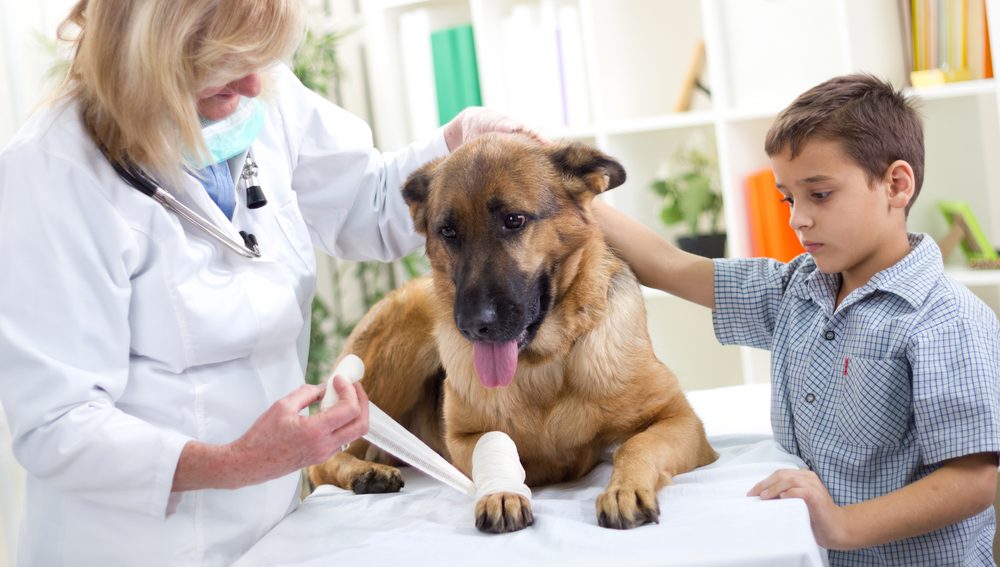
5 Common Pet Emergencies that Require Immediate Veterinary Care
Our four-legged companions are family, and fill our lives with wet noses, cozy cuddles, and adventure. Regular preventive veterinary care, proper nutrition, exercise, and bonding time are essential aspects of caring for a pet. However, the curious and sometimes mischievous nature of pets may lead to an unexpected emergency veterinary visit, and being prepared will ensure you are ready to make decisions if your pet is injured or suddenly becomes sick. Our Harbor Pines Veterinary Center team wants to ensure you can recognize the clinical signs of a veterinary emergency, before your furry friend gets into trouble and needs immediate care. We describe five of the most common pet emergencies and signs; however, never hesitate to contact us immediately if you are worried about your furry pal, whether or not your concern is included below.
#1: Medication ingestion in pets
According to the ASPCA Animal Poison Control Center (APCC), more than 40% of calls in 2019 were attributed to medication poisoning. Many common over-the-counter (OTC) and prescription human medications, including ibuprofen, acetaminophen, and anti-anxiety and blood pressure medications, are dangerous to pets, who cannot metabolize these drugs the same way as humans. Ensure all medications are out of paws’ reach, and keep bags or purses zipped. Medication toxicity signs may not be immediately obvious, but never hesitate to seek immediate veterinary care if you suspect your pet has ingested human medication. In some cases, you may be advised to induce vomiting in your pet, but you must do this only under your veterinarian’s direction.
#2: Dangerous human food ingestion by pets
Some human foods, like baby carrots, are perfectly safe for most pets; however, always avoid sharing your plate with your pet to prevent them from ingesting a toxic or too-rich food. Many people foods are the culprits for veterinary emergencies, including chocolate, raisins, grapes, sugar-free treats, macadamia nuts, onions, garlic, chives, and leeks. Additionally, some toxic foods can cause kidney failure, hypothermia, or life-threatening anemia in pets, who metabolize differently than humans. Pets are also sensitive to rich, fatty foods, which can cause gastrointestinal (GI) distress and inflammation, including pancreatitis. Pancreatitis is a potentially deadly inflammatory condition that can cause vomiting, diarrhea, lethargy, and dehydration.
#3: Trauma and bleeding in pets
Pets who take an unplanned outdoor adventure, or cats who think they can fly from the third story window, are at risk of being hit by a car or breaking bones. Additionally, pets who are hit by a car are often in shock and may not immediately limp or show trauma signs. Bring your pet to our hospital for immediate care if they experience any trauma, or have any of the following signs:
- Vocalizing or biting when touched
- Bleeding that doesn’t stop after five minutes
- Puncture wounds from another animal, whether or not they are swollen or bleeding
- Exposed bone, tissue, or muscles
- Loss of consciousness
- Inability to stand or walk normally
- Swelling of the abdomen
- Bleeding from any orifice, or when urinating or defecating
- Difficult or labored breathing
- Pale, blue, or bright red gums
#3: Allergic reactions in pets
Like humans, pets can be allergic to foreign substances or proteins, and are at risk for severe or anaphylactic reactions. Insect stings, chemicals, or certain grasses commonly cause pet allergic reactions. Vaccine reactions are rare, but can occur. During your preventive care visits, ensure you let your veterinarian know if your pet has previously had a vaccine reaction. Vaccines are vital to protect your pet from dangerous, sometimes deadly, infections. Medications are available to prevent vaccine reactions or treat an allergic reaction, whose signs include:
- Rectal temperature higher than 102.5 degrees
- Hives
- Swelling of the face or muzzle
- Lethargy
- Extreme itching
- Excessive drooling
- Vomiting or diarrhea
- Difficulty breathing
- Decreased appetite
#4: Retching and bloating in pets
Large-breed and deep-chested dogs are most at risk for bloat or life-threatening gastric dilatation and volvulus (GDV). which can occur following a large meal that was quickly ingested. Dogs with GDV will attempt to vomit, or retch, without producing any vomitus. If your pet appears nauseous or has a distended abdomen, take them for immediate veterinary care. Nauseous pets will often drool excessively and appear to be smiling. Other causes for vomiting, retching, or nausea that require emergency care include:
- Liver, kidney, or other disease causing sepsis
- GI blockage
- Toxin ingestion
#5: Straining in pets
Pets who vocalize while attempting to urinate or defecate may be experiencing a urinary blockage or constipation. These conditions are extremely painful for pets, and dogs and cats will posture as if they need to eliminate, without any result. Male cats are most at risk for urinary blockages, which can lead to kidney failure and death without treatment.
Our Harbor Pines Veterinary Center team hopes your pet never requires emergency care, but if you notice any sudden signs or are ever concerned about your pet’s health, call our office, or bring them to the closest emergency veterinary hospital if it’s after hours.

